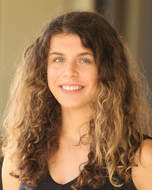|
9/26/2017 Thicker Than Water By Hannah MaerowitzThicker Than Water Six years ago—I am twelve and I hate grocery stores. I associate them with apologies. “I’m sorry, she doesn’t know any better,” I say to the suburban mom with the baby bjorn. I bite my nails on the car ride home. Moving day—my parents cry, she leaves. I go to gymnastics practice for four hours. Tears roll down their cheeks, sweat droplets roll down mine. Three years ago—I wonder why I don’t miss her yet. An entry from my journal: “I worry that my empathy is fundamentally stunted,” I write. “I do not identify with the experience of unconditional love that her autism is supposed to incite in me.” Two months ago—she throws me to the ground with a carelessness that terrifies me. The tile brands my cheek. “Does she love me?” I wonder. Her eyes are bright blue and empty. I stand up. I am scared. I hug her. There are two narratives that I have heard that describe the experience of having an immediate family member with autism. Narrative one—your family member is diagnosed and since you are human, you mourn. You blame yourself, you try to fix it, then you learn acceptance. You share your story, exhibit resilience, and become a bigger person. In my experience, this narrative is a damaging illusion. I feel guilt eat at me every time I watch siblings share a meal or a laugh because I start inventing new personalities for her—personalities that aren’t obscured by violence and disconnect. I do not feel that I became someone with a superhuman capability to accept. Narrative two—your family member is diagnosed and you never get over it. Your life becomes filled up with the speech therapy, IEPs, averted eyes, blatant stares, and apologies that a child with severe autism spectrum disorder tends to provoke. You learn to hate the pity of others. You cease to be yourself and you become a caregiver—someone who does not think about their own future because there are too many “right now” problems that divert your attention. This is not my narrative either. I do not feel as though I was immersed in autism. If anything, I tended towards escapism. Gymnastics, swimming, writing, reading, even chores—anything to avoid living in the suffocating bubble of all things autism. Although accused of being a platitude, it remains true: if you know one autistic person, you know one autistic person. I know my sister, Sarah. She laughs loud at things I don’t understand. She is violent when she is frustrated; sometimes very violent. She is the reason I love the movie Lilo and Stitch and know the words to most Ke$ha songs. She is autistic. This is my narrative: I remember all of the moments when Sarah and I have laughed together because they are scarce and precious. I learned my parents’ limits when I was very young because the care Sarah demands stretched them thin and wound them tight. I have felt the need to shoulder jobs, responsibilities, and classes with the misplaced intention of doubling my accomplishments in an effort to compensate for my parents’ pain. I still struggle to accept help when I need it because some part of me still believes that my needs are secondary. I have resented Sarah. I have cried over her. I have claimed that growing up as her sister did not affect me because doing so felt like defining myself in context of her. However, I now realize that her impact on me is undeniable. There is a taboo around expressing complicated feelings (in my case, many of them negative) surrounding someone that you are supposed to unconditionally love. Admissions of a struggle to love in the midst of jarring pain were never made at the Autism Society events I attended or in my own home. To a certain extent, I understand why—such admissions can feel as if they imply a failure to be a good person. For years, I believed that I was somehow defunct in humanity because the lack of narratives that resembled my own led me to think that my experience was somehow “wrong”. My feelings felt ugly compared to the familiar stories of families united by autism or families paralyzed by grief. With time, I have become willing to admit that my feelings towards my sister are not always certain or loving. Unconditional love for her will always be something that I am working towards; but that is okay—my willingness to continue working towards love despite pain makes me nothing if not human.  Bio: Hannah Maerowitz is an economics student at UC Santa Barbara that is fond of writing, discussing nuanced problems, and all types of visual art. She is currently working on a conceptual photography series about conservation, as well as various writing projects. Comments are closed.
|
AuthorWrite something about yourself. No need to be fancy, just an overview. Archives
April 2024
Categories |

 RSS Feed
RSS Feed
